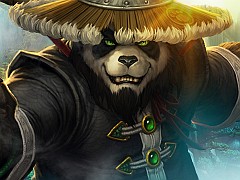You can trust VideoGamer. Our team of gaming experts spend hours testing and reviewing the latest games, to ensure you're reading the most comprehensive guide possible. Rest assured, all imagery and advice is unique and original. Check out how we test and review games here
Mists of Pandaria, the next expansion to be added to World of Warcraft’s roster, has been stirring up controversy since Blizzard announced it. In part you can blame the doe-eyed teddy-sensibilities it brings to the franchise – playable pandas and a Pokemon sub-game smack of an expansion that is absolutely not designed for World of Warcraft’s hardcore players. Still, despite WoW’s older fanbase bemoaning the Pandaren as a race of Pixar B-sides, it’s not entirely out of character for the studio to loosen its grip around MMO traditionalists.
Blizzard has never been a casual studio, but it’s always been one with an eye for a mainstream audience. We’ve already heard NCsoft lamenting the mass success of the genre, while pointing at its popularity as one of the reasons for a lack of experimentation in MMO design:
“I worry, for example, that mass market equals mass budget equals risk aversion equals conservative design,” says Jeremy Gaffney, executive producer at NCsoft’s Carbine Studios. “The great thing about the early MMOs – games like Asheron’s Call, Ultima Online, EverQuest, and Lineage – was the fact they experimented; they weren’t afraid to take different directions.”
But Blizzard, on the other hand, revel in this mass market stuff. This is the studio that spent the early Noughties working to create an MMO as all-inclusive as was possible at the time, veering away from the difficult, niche aspects of earlier MMOs.
In 1999, when EverQuest was enforcing harsh death penalties on players through XP-loss after dying, WoW took XP-loss out of the equation. Where EverQuest 2 required three slash commands to quit out of the game – “/camp”, “/campdesktop”, and “/quitdesktop” – WoW integrated logging out as part of its UI. Where Ultima Online let other users loot your gear once you had died, WoW decided to avoid this altogether.
WoW simplified things for the sake of being universally palatable at a time when MMOs were still largely the domain of a hard-nose breed of RPG fans. Unfortunately, as Blizzard has continued to let its tendrils unravel into the outer-reaches of its potential subscriber-base, it’s plumbed deep enough to entangle the Pandaren – a reference to an April Fools Day joke from Blizzard’s Warcraft III days. This brings to the foreground the question of whether WoW is indeed becoming a casual-player’s game.
It’s not the first time Blizzard has dipped its toes in casual waters. Around the time that casual users began to seem like a viable market – a market first carved out by the likes of Zynga and Facebook – World of Warcraft began integrating mini-games to humour a growing population of casual and app games fans. Cataclysm gave us a Plants vs Zombies mini-game, re-cast with WoW-oriented characters. PopCap went on to give us a WoW add-on that let users play Bejewelled while waiting for raids to begin, or during long in-game flights.
It’s not the first time Blizzard has turned a joke into an aspect of gameplay, either. A screenshot of Diablo II’s Secret Cow Level was released as an April Fools joke by Blizzard during its hey-day, long before players found the actual thing in-game.
But in both cases these have always been peripheral aspects to WoW’s world.
World of Warcraft has gone from leading the brigade into demographically-friendly territory to implementing an entire expansion pack designed for a generation of casual fans. Fans of the new race have said Pandaren aren’t particularly different from WoW’s other lighter fare – the goblins with New Jersey accents; the snow-ball fights; Darkmoon Faire; or giant owl-like Moonkin to name a few. But where previously the studio took the MMO out of its hobbyist confinements to open it up to a wider userbase, its upcoming expansion now focuses on a single market.
Whether this is the natural trajectory for the game is another question entirely. But for the first time in nearly a decade, WoW seems to be actively ignoring a portion of its previous fanbase, having moved away from the universality it initially pioneered.
World of Warcraft
- Platform(s): macOS, PC
- Genre(s): Fantasy, Massively Multiplayer, Massively Multiplayer Online, RPG

/https://oimg.videogamer.com/images/85ef/wow_mists_of_pandaria_25.jpg)
